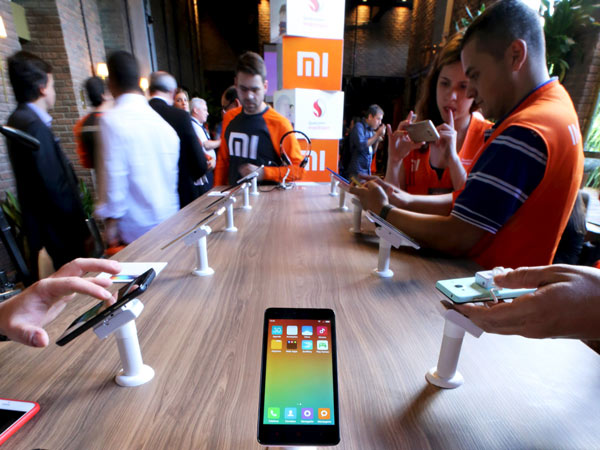Xiaomi takes first big step outside Asia with Brazil smartphone
Updated: 2015-07-01 08:36
(Agencies)
|
|||||||||||
 |
|
China's Xiaomi Redmi 2 smartphones are displayed to the media during their launch in Sao Paulo, Brazil, June 30, 2015. [Photo/Agencies] |
Chinese smartphone maker Xiaomi has started making devices in Brazil for sale locally, promising to dramatically undercut rivals on price in the first big step beyond Asia for the world's most valuable technology start-up.
Xiaomi's global vice-president, Hugo Barra, said in an interview on Tuesday that Brazil was "stage one of our Latin America launch," pointing to Mexico and Colombia as logical next steps in the region, although he declined to say when.
Without traditional advertising or stores, China's top-selling smartphone company is betting that a tempting price tag will capture the attention of Brazilians who have become increasingly cost sensitive as their economy sours.
"We offer high-quality products at incredibly aggressive prices, so we're starting with larger developing markets where people are very price-sensitive," Barra told Reuters.
At a launch event earlier in the day, he announced that the entry-level Redmi 2 smartphone would go on sale in Brazil next week for 499 reais ($160).
The phones are already rolling off an assembly line outside of Sao Paulo run by Foxconn Technology Group, the same contract manufacturer making Apple's iPhone in the country since 2011.
An unlocked Brazilian iPhone can retail for more than $1,000 -- one of the highest prices in the world and well above what they sell for in the United States. Even more affordable options in the country remain out of the reach of ordinary Brazilians.
Just three years after selling its first phone, Beijing-based Xiaomi, dubbed 'China's Apple', is worth $45 billion, making it the most valuable start-up in the technology sector.
By choosing Brazil as its first smartphone market outside of Asia, Xiaomi keeps its focus on emerging consumer markets, working in from the edges of a global market dominated by giants such as Apple Inc and Samsung Electronics Co.
Brazil's smartphone market is also at a tipping point, with users swapping simpler feature phones for smartphones to keep up their avid social-media habits. Smartphone sales in the country jumped 55 percent to 54.5 million units last year despite stagnant economic growth, according to market research firm IDC.
Xiaomi, which is the fifth-highest selling smartphone brand in the world, aims to break into the Brazilian market with its novel business model, Barra said. Low profit margins on handsets are meant to win user loyalty for the company's software and an array of more profitable home electronics and accessories.
Related Stories
Xiaomi eyes expansion in online video content 2015-06-11 13:29
Xiaomi introduces new smart router 2015-06-11 15:59
Xiaomi props up presence in online video 2015-06-11 08:22
Xiaomi second-biggest wearable seller in the world 2015-06-08 11:34
Xiaomi enters American market 2015-06-05 10:12
Today's Top News
China, France prioritize financial partnership in third-party markets
Greece's bailout expires, country defaults on IMF payment
New visa centers to ease Chinese visits to Europe
China and Russia promote 'red tourism'
China unveils ambitious climate goals
Mass casualties in Indonesian military plane crash
Search is on for new investments
Chinese stocks post biggest gain since 2009
Hot Topics
Lunar probe , China growth forecasts, Emission rules get tougher, China seen through 'colored lens', International board,
Editor's Picks

|

|

|

|

|

|






